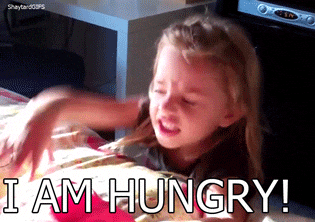3 Diet Myths to Stop Following TODAY

Within the last century, a new wave of diet culture surfaced by changing how we eat. Don’t eat after 7, don’t eat carbs for breakfast, don’t eat on the couch, don’t eat while emotional, eat six small meals a day, eat two large meals a day, don’t eat before 11 am, eat within thirty minutes of waking.
And because I just can’t resist, let’s debunk a few of these!
Myth 1: "Don't eat past 7 PM"
Researchers and Dietitians can’t seem to agree on how or when the ‘don’t eat after 7’ myth was born, which is already a bad sign. But this aimless rule spread like wildfire, teaching most dieters in the 21st century that if you eat food after dark that food is immediately turned into fat. This assumes that everyone exists on the same schedule, get out of here shift workers, those who stay up later, or anyone outside of the 9-5 workday!
But hunger doesn’t have a watch, and your blood sugar doesn’t look at the clock.
A healthy blood sugar curve keeps you satiated for about 4-5 hours after eating. This means that if you had dinner at 6 or 7, you are likely to find yourself naturally hungry at around 10-11 PM. The science that gave this myth legs was that sleep is our body’s time to rest and digest, and having a large meal right before bed can disrupt your quality of sleep. So, yeah, if you are eating double portions of Fettuccine Alfredo 15 minutes before bed, this can make sense.
But to actually feel your body signaling hunger and refusing it because an arbitrary time has passed keeps us from ever being able to listen to our bodies - bodies that are far more intelligent than our diet rules.

Myth 2: Your body doesn't need carbs:
Carbohydrates are your body's primary fuel source. They are the ideal. The average female brain needs a MINIMUM of 130 grams of carbohydrates per day. They are essential for hormonal health, cognition, healing, and to feed the good bacteria in your gut. When carbs are super low, your body will try to use fats for energy first, then protein as a last ditch effort. Keto dieters often say that the body doesn't need carbs to survive, this is a concept called becoming fat adapted. While you may not need carbs to survive, you do need carbs to thrive. Carbohydrates are some of the most healing, medicinal foods on the planet. Cutting carbs means cutting out vitamins, minerals, and nutrients that our bodies scream for.
Here is a real life example: Okinawa Japan is a Blue Zone and is home to the world's longest living women. They have 1/5 the rate of dementia and have more female centenarians (people that live past 100) than anywhere else on Earth. What do they eat? 94% of their diet comes from carbohydrates, specifically Japanese Sweet Potatoes and white rice. SOOOO maybe we have bodies DESIGNED to be able to thrive with carbs, rather than counting and demonizing them.
Thanks to all of the diets selling new food fears and low carb protocols, but our physiology knows best. This isn’t about going on a high or low carb diet, this is about realizing that there are beautiful, vibrant foods that our intelligent bodies were designed to eat. And a lot of them grow from the ground.. and a lot of them are carbs.
Myth 3: You have to eat 1200 calories a day to lose weight:
Made popular by random magazine articles, fad diets, and accounts of different models daily diets, most people are told they have to eat 1,200 calories to lose weight, no matter who you are, how much you now eat, your activity levels, or current weight. This is BOGUS.

1,200 calories a day is the nutritional recommendation of a TODDLER. When we eat this way consistently we are teaching our bodies to run on less energy, to actually slow down our metabolism to match the food supply coming in. These fad low calorie diets give great before and after photos of a 1 month transformation but leave the dieter with a suppressed metabolism and a frustrating path of chronic weight regaining. These low calorie diets make us more fixated with food, irritable, tired, low on energy, low libido, difficulty focusing, decreased performance, etc...
How we eat, what we eat, when we eat, any new protocol that can promise us the missing piece that will make us feel confident in our body and stop questioning our every bite. Link by link, we adopt these new rules to form our cages that help to tamper this out of control feeling we have around food. But they don’t make us feel more confident, they make us feel less trustworthy, if we were to remove these shackles.
Here is a slice of counter cultural encouragement, your health was never meant to be a challenge. This restrictive list of do’s and don’ts that you grit your teeth and bear for 21 days until you can get back to your real life. You shouldn’t have to be in a contained, isolated environment with meal prepped, measured, and tupper-wared foods in order to reach the pinnacle of health.

